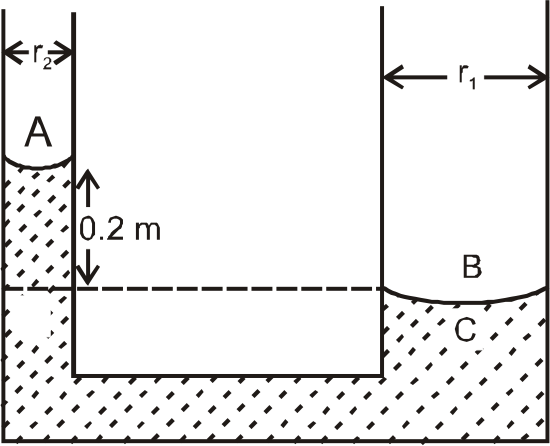A barometer contains two uniform capillaries of radii 1.4×10−3m and 7.2×10−4m. If the height of liquid in narrow tube is 0.2m more than that in wide tube, calculate the true pressure difference. Density of liquid =103kg/m3, surface tension =72×10−3N/m and g=9.8ms−12.
1360Nm2
1260mm
860Nm2
1860Nm2
The correct Answer is:D
let the pressures in wide and narrow limbs P1 and P2 respectively. If R1 and R2 be the radii of wide and narrow tube. The pressure just below the meniscus of wide tube =P1−2TR1 and pressure just below the meniscus of narrow limb =P2−2TR2
Therefore , difference of these pressures
(P1−2TR1)−(P2−2TR2)=hρg
Therefore, true pressure difference,
P1−P2=hρg−2T(1R2−1R1)
For the water and glass surface, taking the angle of contact θ to be zero, we have
R1=r1cosθ≈r1,R2=r2cosθ≈r2
Where r1 and r2 are wide and narrow limbs respectively
P1−P2=hρg−2T(1r2−1r1)=0.2×103×9.8×−2×72×10−3×(17.2×10−4−11.44×10−3)
=1.96×103−0.10×103
=1.86×103Nm2=1860Nm2
Topper's Solved these Questions
- BOOK - NARAYNACHAPTER - MECHANICAL PROPERTIES OF FLUIDSEXERCISE - integer Type Questions25videos
MECHANICAL PROPERTIES OF FLUIDS
- BOOK - NARAYNACHAPTER - MECHANICAL PROPERTIES OF FLUIDSEXERCISE - Level 1 (H.W)55videos
MECHANICAL PROPERTIES OF FLUIDS
- BOOK - NARAYNACHAPTER - MECHANICAL PROPERTIES OF FLUIDSEXERCISE - Paragraph Type Questions5videos
MECHANICAL PROPERTIES OF FLUIDS
- BOOK - NARAYNACHAPTER - MATHEMATICAL REVIEW & PHYSICAL WORLDEXERCISE - C.U.Q13videos
MATHEMATICAL REVIEW & PHYSICAL WORLD
- BOOK - NARAYNACHAPTER - MECHANICAL PROPERTIES OF SOLIDSEXERCISE - LEVEL-II (H.W)24videos
MECHANICAL PROPERTIES OF SOLIDS
Similar Questions
A barometer contains two uniform capillries of radii 1.44×10−3m and 7.2×10−4m. If the height of the liquid in the narrow tube is 0.2m more than that in the wide tube, calculate the true pressure difference. Density of liquid =103kg/m3, surface tension =72×10−3N/m and g=m/s2.
View SolutionThe limbs of a manometer consist of uniform capillary tubes of radii are 10−3&7.2×10−4m find out the correct pressure difference if the level of the liquid in narrower tube stands 0.2 m above that in the broader tube. (density of liquid =103kg/m3, surface tension =72×10−3N/m)
View Solution
Knowledge Check
- Question 1 - Select One
If water rises in a capillary tube upto 3 cm . What is the diameter of capillary tube (Surface tension of water =7.2×10−2N/m)
A9.6×10−4mB9.6×10−3mC9.6×10−2mD9.6×10−1m - Question 2 - Select One
Two seperate soap bubbles of radii 3×10−3 m and 2×10−3 m respectively, formed of same liquid (surface tension 6.5×10−2 N/m) come together to form a double bubble. The radius of interface of doubl bubble is
A6×10−3 mB4×10−3 mC1.5×10−3 mD0.66×10−3 m - Question 3 - Select One
The breaking force of wire is 104N and radius is 1×10−3m. If the radius is 2×10−3m, then the breaking force will be
A4×104NB40×104NC0.04×104ND0.4×104N
The limbs of a manometer consists of uniform capillary tubes of radii 1.44×10−3m and 7.2×104m. If the level of the liquid in the narrower tube stands 0.2 m above that in the broader tube, pressure difference between A and B is found to be 310λN/m2. Here λ is an integer. Find λ (density = 103kg/m3, surface tension = 72×10−3N/m). (take g=9.8m/s2)
 View Solution
View SolutionCalculate the speed of longitudinal wave in steel. Young's modulus for steel is 3×1010N/m2 and its density 1.2×103kg/m3
View SolutionTo what height does the liquid rise in a capillary tube of radus 0.25 mm, when dipped in a liquid of density 0.8×103kgm−3 and surface tension 0.05 N m−1? Given (cosθ=0.4)
View SolutionCalculate the speed of longitudinal wave in steel. Young's modulus for steel is 3×1010N/m2 and its density 1.2×103kg/m3
View SolutionA liquid rises to a height of 7.0 cm in a capillary tube of radius 0.1 mm. The density of the liquid is 0.8×103kgm−3.If the angle of contact between the liquid and the surface of the tube zero , calculate the surface tension of the liquid Given g=10ms−2.
View Solution
